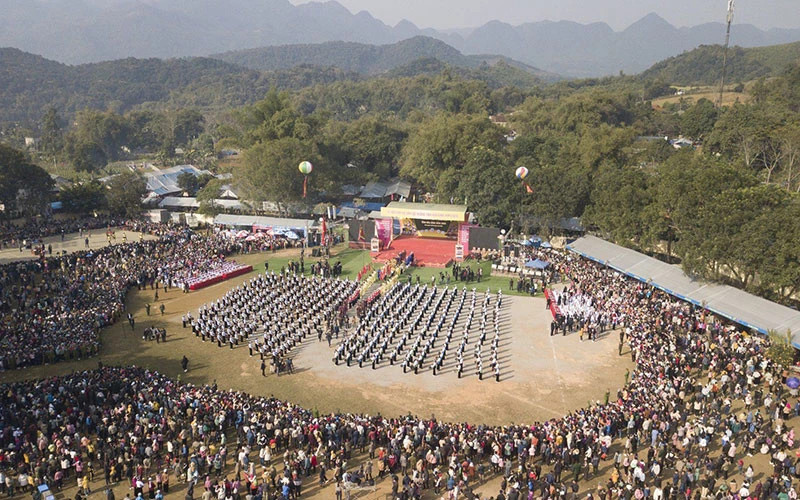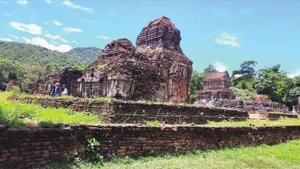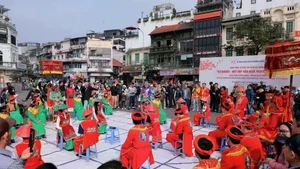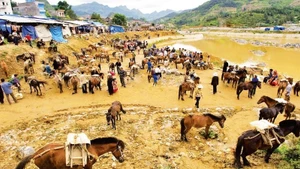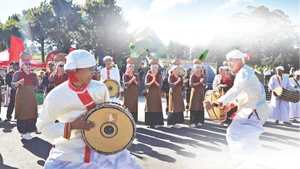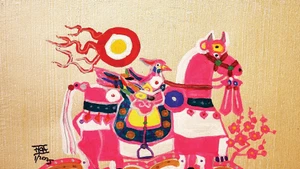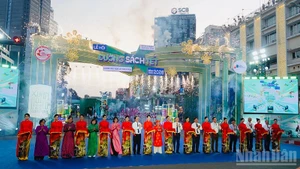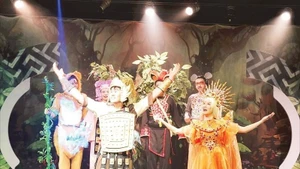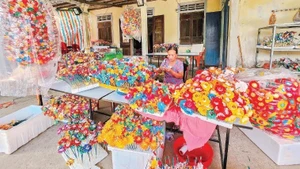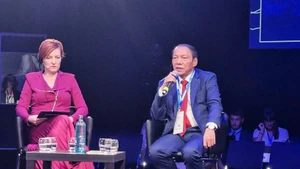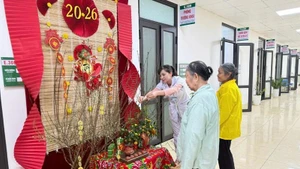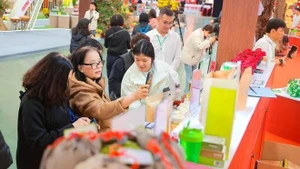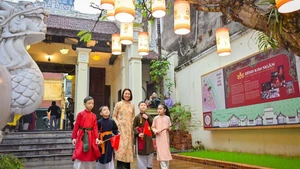Muong ethnic cultural values are invaluable assets that unite the Vietnamese ethnic community. The Muong people in Hoa Binh Province have created unique cultural values from customs, practices, beliefs, cuisine, folk songs, proverbs, festivals, folk knowledge and Mo Muong (a type of folk rite practised at funerals or rituals). Meanwhile, “Hoa Binh Culture” had an important position during the Stone Age in Vietnam, as well as the world. It is also an extremely valuable asset to humanity.
However, in the flow of time and with the increasing development of the market economy, the Muong ethnic group’s identity and "Hoa Binh Culture" have been gradually eroded. Therefore, more than ever, it is important to preserve and promote the cultural values of the Muong ethnic group is urgent. Currently, in many rural areas, the precious values of Muong ethnic culture and “Hoa Binh Culture” have been lost.
Faced with that situation, Hoa Binh Province has been making efforts to preserve and promote the intangible and tangible cultural values of the Muong people and "Hoa Binh Culture".
Nguyen Phi Long, Secretary of the Hoa Binh Provincial Party Committee, said: “The province considers this issue an extremely urgent task, and although the province is facing difficulties in resources, the province is still determined to implement the task”.
“On November 24, 2023, Hoa Binh Province issued a project to preserve and promote the cultural values of the Muong ethnic group and "Hoa Binh Culture" for the 2023-2030 period, to continue researching, preserving and promoting the values of cultural heritages and fine traditions of the Muong people, contributing to promoting the land and people of Hoa Binh, developing unique tourism products to attract both domestic and international visitors, and boosting socio-economic development of the locality in the near future”, he added.
Quyet Thang High School in Lac Son District established a club to preserve Muong ethnic cultural identity in 2019. Since then, the school has focused on carrying out an educational model to preserve and promote the cultural values of the Muong ethnic minority group for students.
The club focuses on six main areas including folk songs, costumes, musical instruments, cuisine, games, and folk culture. In addition, the club also organised classes on Muong letters for members of folk song and folk culture groups. Through many practical and useful activities, the club has helped students learn more about the Muong ethnic cultural identity.
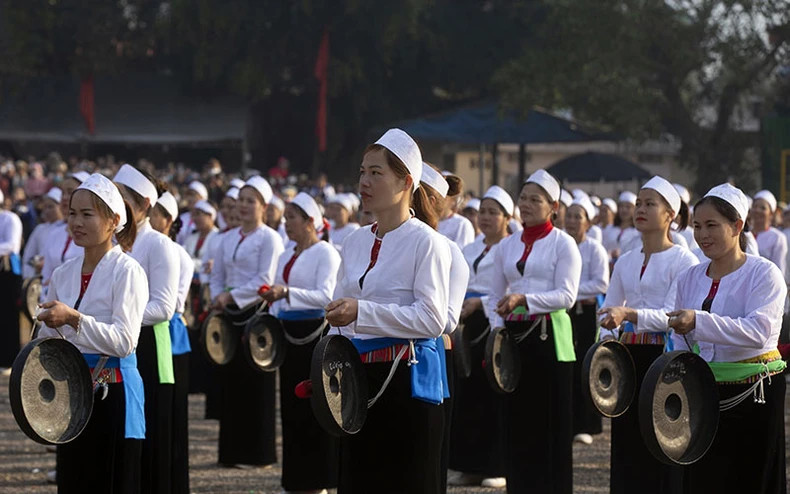 |
| A performance of Muong gongs at the “Khai ha” festival in 2023. (Photo: TRONG DAT) |
Dinh Thi Kieu Dung from Bo Town, Kim Boi District, has opened free classes teaching Muong folk songs for young generations for 20 years. She said: “In addition to my passion for national culture, I feel I need to contribute my responsibility to preserve and promote the identity and values of Muong ethnic culture left by our ancestors. I have opened classes to teach Muong culture since 2004 so that when they grow up, they will be proud to be children of the Muong community and love their homeland more”.
To preserve and promote the cultural values of the Muong ethnic group and "Hoa Binh Culture", the provincial authorities have supported artisans to participate in preserving and promoting cultural heritage values, encouraging scientists to study and Muong ethnic children who are learning the cultural field, to work in cultural agencies at all levels.
Secretary of Hoa Binh Provincial Party Committee Nguyen Phi Long said the province will mobilise resources to invest, manage, protect, exploit and promote values of traditional cultural heritages and archaeological cultural heritages associated with sustainable tourism development, contributing to promoting socio-economic development, improving the material and spiritual life of the people, investing resources and facilities for research, collection, preservation and promotion of cultural heritages of the Muong ethnic group and "Hoa Binh Culture".
In the near future, the province will boost the promotion and introduction of heritage values widely both in the country and abroad, as well as focus on repairing and embellishing the landscape of the national relic site of Xom Trai Cave in Tan Lap District and the Stone Roof of Vanh Village in Yen Phu Commune of Lac Son District. They are typical relics of "Hoa Binh Culture" in Hoa Binh Province. The dossier will be submitted to the Prime Minister for recognition of these relics as special national relic sites and towards UNESCO’s inclusion in the list of cultural heritage of humanity.
Relevant departments and agencies in the province will devise specific tasks to build a Muong ethnic cultural space conservation area in association with tourism development in Tan Lac District.
According to Vice Chairman of Hoa Binh Provincial People’s Committee Nguyen Van Toan, the province selected five Muong community-based tourism destinations for the recovery of traditional houses on stilts towards preserving cultural space to serve visitors.
In addition, the province is completing the scientific dossier of Mo Muong’s cultural heritage to submit to the Prime Minister and UNESCO on inclusion in the list of cultural heritage of humanity.
The inventory, collection, documentation, restoration and promotion of the intangible cultural heritage of the Muong ethnic minority group is in the areas of social practices and beliefs, traditional festivals, folk performing arts, traditional crafts, folk knowledge, speech, letters and folk literature. In particular, five intangible cultural heritages of the Muong people were proposed to the list of national intangible cultural heritage.
The province also focuses on restoring typical traditional festivals and folk games associated with developing unique and attractive tourism products as well as promoting unique traditional festivals, traditional costumes, houses on stilts, folk songs, Muong gongs, Mo Muong and beautiful customs of the Muong ethnic group in Hoa Binh. Muong people’s language has been taught at several schools in the province.
The above synchronous solutions will bring practical effects in exploiting the value of the Muong ethnic cultural heritage and "Hoa Binh Culture". They will contribute to arousing pride and becoming a driving force for the socio-economic development of Hoa Binh Province in the near future, gradually transforming the economic structure, labour structure and occupations in rural areas, increasing income, reducing poverty sustainably for people, especially the Muong ethnic people in highland and remote areas and creating valuable cultural products, serving sustainable tourism development.
